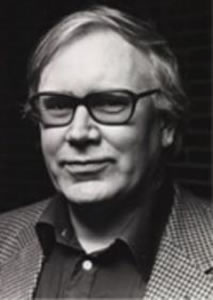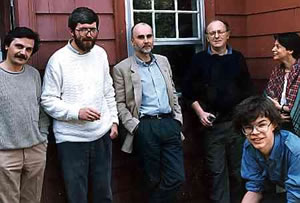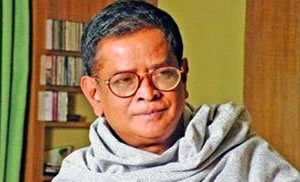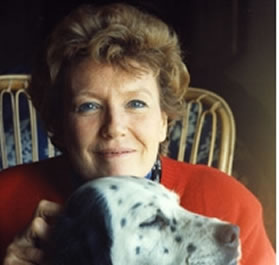|
De Nederlandse dichter, journalist en columnist Nico Scheepmaker werd geboren in Amsterdam op 13 november 1930. Zie ook alle tags voor Nico Scheepmaker op dit blog.xml:namespace prefix = o ns = "urn:schemas-microsoft-com:office:office" />
Dommepraat
Ik lees nog wel zo lief een detective
als de memoires van Nadjezda Mandelstam.
Een mens wordt wel eens moe van het gedram
waarmee zon boek de mensheid wil gerieven.
En dat geldt idem dito voor de beelden
waarmee de televisie ons ontwricht.
Met uppercuts slaat zij de ogen dicht
van wie zich bij Mies Bouwman niet verveelden.
Natuurlijk is dit dommepraat. En rechts.
Ik ben het ook oneens met wat hier staat
zolang het om het een óf ander gaat.
Het werkelijke leven ken je slechts
als je behalve Mandelstams memoires
ook onderkent dat Pietje Keizer waar is.
Een blijvertje
Het feit dat ik in Holland ben geboren,
en bovendien precies in Amsterdam,
bewijst toch wel dat ik ben uitverkoren:
ik kreeg de hamvraag en ik won de ham.
Een ander wordt geboren in Vietnam
of raakt bij voorbaat in Algiers verloren,
maar ik, die zo terloops ter wereld kwam,
mag rustig tot de blijvertjes behoren.
En ook het tijdstip was perfect gekozen:
te jong voor crisis, oorlog en verzet.
Wat dat betreft zat ik dus ook op rozen,
want niemand gaf mij later een brevet
van onvermogen in het goede of boze.
Mijn leven is een aangenaam verpozen,
een ander krijgt de schillen en de dozen.

Nico Scheepmaker (13 november 1930 - 5 april 1990)
De Poolse dichter, vertaler en literatuurwetenschapper Stanisław Barańczak werd geboren op 13 november 1946 in Poznań. Zie ook mijn blog van 13 november 2008 en ook mijn blog van 13 november 2009 en ook mijn blog van 13 november 2010.
Uit: Garden Of Amzing Delights (Bespreking van Unattainable Earth van Czeslaw Milosz.)
On the other hand, Mr. Milosz's certainty that the earth is something real and tangible is coupled with his incessant awareness that the earth is ''unattainable,'' ''too huge to be grasped.'' We humans have our share in it, but we are separated from its essence by the dim screens of our imperfect senses, our fallible memory, our limited language: Consciousness enclosed in itself every separate birch And the woods of New Hampshire, covered in May with green haze. The faces of people are in it without number, the courses Of planets, and things past and a portent of the future. Then one should extract from it what one can, slowly, Not trusting anybody. And it won't be much, for language is weak. Even what is enclosed in our consciousness can be only partly expressed, since our human consciousness is ''weak'' and limited itself. We are able to perceive solely the external surface of things, and we only vaguely sense the existence of its ''other side'': Fat and lean, old and young, male and female, Carrying bags and valises, they defile in the corridors of an airport. And suddenly I feel it is impossible. It is the reverse side of a Gobelin And behind there is the other which explains everything.
Here we encounter the metaphysical and religious poet, one who is able to note down, apparently with an approving nod, this statement from the philosopher Rene Le Senne: ''For me the principal proof of the existence of God is the joy I experience any time I think that God is.'' But Mr. Milosz is also able to record this thought: ''A decent man cannot believe that a good God wanted such a world.'' That is because the world - both the world of nature and the world of human history - is tainted by the constant presence of evil. In other words, the earth is unattainable to our imperfect senses, intellect or language; it is unattainable because the coexistence of a good God and unwarranted suffering is something beyond our comprehension.

Stanisław Barańczak (Poznań, 13 november 1946)
V.l.n.r. Wojciech Wołyński, Stanisław Barańczak, Adam Zagajewski, Josif Brodski, Barbara Toruńczyk
De Bengaalse schrijver Humayun Ahmed werd geboren op 13 november 1948 in Kutubpur in het toenmalige Oost-Pakistan, nu Bangladesh. Zie ook mijn blog van 13 november 2008 en ook mijn blog van 13 november 2010.
Uit: Now Cloud, Now Sunshine
Village. Jorina and her mother. Jorina has sat to eat rice. She has placed her doll beside her.
There is rice on Jorinas plate. She passed some rice to the empty plate in front of the doll.
Mother: Thats enough Jorina! Playing with the doll is not same as doting on her.
Mother took back the rice from the dolls plate to Jorinas plate.
Mother (grunting): Like father like daughter! The girl is just like her father.
Jorina: Is my father dotty?
Mother: You dote on your doll whereas your dad dotes on his flute. Spending time in the woods
with flute and hoping to conjure up a fairy from the sky! He would flirt with the fairy!
Jorina: Father is not in the woods now. He has gone to Dhaka.
Mother: Dont be so insolent. He has redeemed me by going to the city! No word from him,
neither any money.
Jorina: You left the village too.
Mother: Did I have an option? You want me to gorge myself with the soil of our village home?
Jorina: Hu!
Mother: What did you say?
Jorina: The two of us yearn to go to Shuvopur.
Mother (surprised): The two of you? Who is the other one?
Jorina: My doll. She cries for going to Shuvopur.
[Mother is staring in utter astonishment]
2
Daytime. Village. Rafik has come to village. He got puzzled after entering into his house. Empty
house. No ones around.
Rafik: Jorina? Where are you all?
A little boy from the neighboring house showed up.
Little Boy: They are gone.
Rafik: Where?
Little Boy: I dont know.
Bedazzled Rafik sat down.

Humayun Ahmed (Kutubpur, 13 november 1948)
De Italiaanse schrijfster Dacia Maraini werd geboren op 13 november 1936 in Fiesole. Zie ook mijn blog van 13 november 2008 en ook mijn blog van 13 november 2009 en ook mijn blog van 13 november 2010.
Uit My Husband (Vertaald door Vera F. Golini)
My husband is blond, has a receding hairline, white teeth and light skin, with big brown freckles. My husband is elegant, dresses with care, and always scents his hair with cologne. He oversees the
work of tellers in a bank and earns a good monthly salary.
W h e n e ver my husband speaks I listen carefully. His voice is soft, velvety, and a bit tense. The things he says are always very precise and correct. Ive never heard him say anything out of place or foolish.
My husband is loved by his friends and respected by superiors; whenever he wishes he can also be a man of the world. He can sit right in the centre of a circle of people and just talk or discuss things. He defends the truth and checks his friends enthusiasm, driven as he always is by perfectly
good sense.
My husband is a man of class, but he loves practical jokes. Sometimes I find a toad in my bed, or jam in my slippers. Once he even served me a dessert hed made with a dead mouse inside.
My husband is a stamp collector. Sometimes he steals the neighbours mail and cuts out the stamps for his collection. He has two albums, thick as phone books, stuffed with valuable stamps. He says some day hell sell his stamps and with the money hell build us a house in the country.
In those albums, besides the stamps, my husband keeps new banknotes fresh from the mint. He says that the first of a new issue brings good luck. So he sneaks them from the cash box, slips them into small transparent light blue envelopes, and affixes them to the pages of the album with Scotch tape.
His colleagues think hes very wise and intelligent, so they come to the house to confide in him, ask his advice. They come on Sundays for the most part, and Im usually the one who answers the door. When I fin d myself staring at a stuffed and dumb face, eyes rolling nervously around, I know its one of Marios colleagues and immediately show him to the living room.

Dacia Maraini (Fiesole, 13 november 1936)
|



